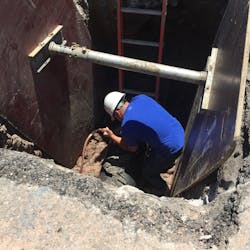BUFFALO, NY, OCT 21, 2019 -- Mayor Byron W. Brown and Buffalo Water Board Chairman Oluwole “OJ” McFoy recently announced that Buffalo “Replace Old Lead Lines” (ROLL) program has replaced over 100 water lines since its launch in late June. This pilot program, funded through $567,000 from Governor Andrew M. Cuomo’s water line replacement initiative, as well as a $155,000 member item grant from Senator Jacobs, and a $100,000 Department of Environmental Conservation grant, has enabled the City to replace residents’ water service lines when those lines experience a break or a leak.
“With the announcement of this program earlier this year, it was my goal to further the city’s commitment to combatting lead exposure, while also making our communities healthier and stronger,” Mayor Brown said. “Replacement of lead service lines will not only ensure the continued safety of our drinking water, but it will also enhance residential infrastructure making it more resilient for the future.”
Water service lines are the component of the water delivery infrastructure that carry drinking water from the City’s water main to the residents’ home. When these lines are compromised, either as a result of a break or a leak, they need to be replaced. When the lines are only repaired, lead particles are disturbed and can enter a homes’ drinking water. Beginning January 1, 2020, the City will require that all service lines made of lead, or having a lead component, will have to be replaced when they experience a break or leak. Residents should ensure that water service line replacement is part of their home or renters’ insurance, which can usually be purchased for a relatively small cost. Buffalo Water has also formed a partnership with Homeserve that will allow residents to purchase affordable water service line protection with no deductible.
“The ROLL program has allowed Buffalo Water to take another step in furthering our mission to protect the health and well-being of the people we serve as well as protecting water infrastructure and the environment for future generations,” said Water Board Chair OJ McFoy.
The City’s Water Authority takes several steps to protect the integrity of water service lines. The water is treated with a phosphate-based corrosion inhibitor. This process creates a protective layer inside service connections and plumbing systems, minimizing the potential for contaminants, such as lead, to leach into the drinking water. The anti-corrosive inhibitor is in addition to the City of Buffalo voluntarily adopting a lead in water action level of 5 parts per billion, making the City’s drinking water one of the safest in the nation.



